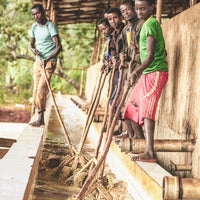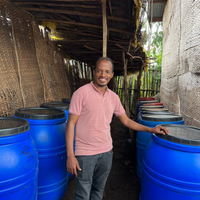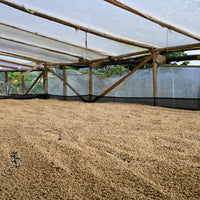Origin: Ethiopia
Region: Yirgacheffe
Sub region: Edido
Washing Station: Aricha
Altitude: 1850 - 1880 meters above sea level
Variety: Heirloom
Process: Anaerobic Natural
Tasting Notes: Soft and syrupy sweetness with notes of strawberry, white nectarine, raspberry jam and florals.
First, cherries were immersed and floated in the water tanks to remove the low-density coffees, and the cherries were closed air-tight and in a fully sealed and controlled anaerobic fermentation tank. The tanks are regulated by valves to ensure no oxygen can seep throughout the fermentation process. The fermentation occurred for 7 days until the pH level dropped to 3.8 to get the desired profile of winey, dry fruit, juicy, fruity flavours, and rich floral. Throughout the 7 days, the fermentation tanks were placed in concrete water baths to maintain a constant temperature between 15 and 18 degrees Celsius and to keep the fermentation very slow. The fermentation process was homogenized by rotating or moving the tanks.
At the end of the seventh day, the fermentation is suspended by removing the cherries from the tanks.
On day one, quick drying is applied until the coffee humidity drops to 35%. Cherries were dried for 30 days under a shade net on African beds. Once the drying period was completed, and the humidity decreased to 12%, cherries were collected and stored in a conducive warehouse for four weeks of resting time.
It is important to note this coffee was intentionally processed utilizing anaerobic fermentation. In general, placing freshly-harvested cherries inside a sealed container or bag of some sort for a period of time will create a flavor impact. We find those anaerobically-fermented coffees often exhibit an increase in the intensity of fruit and acidity and a slight increase in the body. Nonetheless, the anaerobic fermentation process has a distinct impact on the outcome of the flavor profile.
Aricha is the name of the washing station where this coffee is processed. Edido is the village, or kebele, where this coffee is grown and processed, in a microregion of Yirgacheffe. Aricha is about 8 kilometers from the center of Yirgacheffe Town. The soils in this region are red-brown clay soil, about 1.5 meters deep. We like the complex, almost tropical quality of coffees from Aricha, along with their juicy fruitiness and sugary, floral sweetness.
Coffees in Ethiopia are typically grown on very small plots of land by farmers who also grow other crops. The majority of smallholders will deliver their coffee in cherry to a nearby washing station or central processing unit, where their coffee will be sorted, weighed, and paid for or given a receipt. Coffee is then processed, usually washed or natural, by the washing station and dried on raised beds.
The washing stations serve as many as several hundred to sometimes a thousand or more producers, who deliver cherry throughout the harvest season: The blending of these cherries into day lots makes it virtually impossible under normal circumstances to know precisely whose coffee winds up in which bags on what day, making traceability to the producer difficult. We do, however, make every available effort to source coffee from the same washing stations every year, through our export partners and their connections with mills and washing stations.
Typically farmers in this region don't have access to and therefore do not utilize fertilizers or pesticides in the production of coffee.







